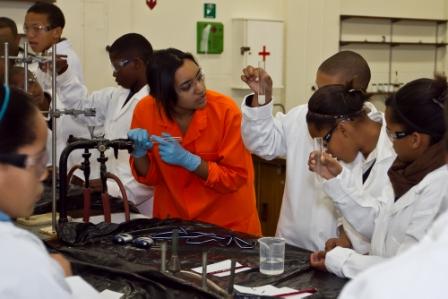
Demonstrating catalysts, making oxygen, freezing bananas and creating slime is a course requirement for students, forming a part of the new Chemistry Honours service learning module at Rhodes.
When a grade 7 learner in an oversized lab coat held a candle attached to a long stick to a balloon, the flash combustion gave him a fright.
The class of forty-odd Grahamstown Primary learners roared with laughter at the sight of their classmate - but all in good fun - this is the Chemistry Department’s entertaining idea of science education.
It may be surprising that this wasn’t just fun and games for the learners or the honours level Chemistry students, Alicia Singh and Melody Mangeruke, conducting the class.
Joyce Sewry, lecturer in the Rhodes Chemistry Department, explained that the module gives students the valuable experience of working with children. “The most important thing is they learn to publicly communicate science,” said Sewry.
Developed through a collaboration with Bristol University, the experiments are designed to get kids excited about science from a young age. But the course also demonstrates one of Rhodes University’s core values, community engagement.
There has been a strong focus on community engagement in recent years, evident by its increasing integration into the curriculum. The Honours Chemistry module expresses the particular kind of engagement Rhodes seeks to do, it aims to be both relevant and mutually beneficial.
“This is a wonderful opportunity for them to come. They don’t have a lab at school and can’t do these experiments -- they can only do the basic ones,” said the principal of Grahamstown Primary, Leon Coetzee, who also attended the demonstration.
Coetzee explained that much of the science in the curriculum involves safety demonstrations and health promotion, and deals with things the learners encounter every day, like electricity and household detergents. “I think just dressing up in glasses and lab coats and to practically get involved with the experiments -- they enjoy it because they’re doing something.” Coetzee judged that the learners were so well-behaved because they were interested.
Not only are the learners discovering new things and getting excited about science, they are interacting with university students and seeing how career pathways are formed.
Former Model C and disadvantaged schools are exposed to opportunities that they may not have imagined, through these relatively brief but memorable interactions.
Such interactions are not entirely one-sided, however -- and that is exactly the point. “You can see that some students just take to it,” said Sewry, gesturing to an Honours student who had grown so enthusiastic she was taking over one of the demonstrations from her colleague. It’s a kind of experiment where there are valuable things to learn from both sides of the table.
Story by Hailey Gaunt
Picture by Judith Doubell
